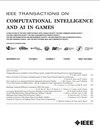学习使用马尔可夫模型生成电子游戏地图
Q2 Computer Science
IEEE Transactions on Computational Intelligence and AI in Games
Pub Date : 2017-12-01
DOI:10.1109/TCIAIG.2016.2623560
引用次数: 63
摘要
程序内容生成是近年来的一个热门研究课题。然而,大多数内容生成系统都是专门针对单个游戏的。我们感兴趣的是可以在没有特定游戏算法设计的情况下为各种游戏生成内容的方法。统计方法是这类生成器,更具体地说,地图生成器的一个很有前途的途径。在本文中,我们探讨了马尔可夫模型作为一种建模和生成多个领域内容的方法。我们将马尔可夫模型应用于《超级马里奥兄弟》、《洛德龙》和《小伊卡洛斯》,以确定我们的模型在生成内容的可玩性、模型的表达范围以及训练数据对这些表达范围的影响方面的表现。本文章由计算机程序翻译,如有差异,请以英文原文为准。
Learning to Generate Video Game Maps Using Markov Models
Procedural content generation has become a popular research topic in recent years. However, most content generation systems are specialized to a single game. We are interested in methods that can generate content for a wide variety of games without a game-specific algorithm design. Statistical approaches are a promising avenue for such generators and, more specifically, map generators. In this paper, we explore Markov models as a means of modeling and generating content for multiple domains. We apply our Markov models to Super Mario Bros., Loderunner , and Kid Icarus in order to determine how well our models perform in terms of the playability of the content generated, the expressive ranges of the models, and the effects of training data on those expressive ranges.
求助全文
通过发布文献求助,成功后即可免费获取论文全文。
去求助
来源期刊

IEEE Transactions on Computational Intelligence and AI in Games
COMPUTER SCIENCE, ARTIFICIAL INTELLIGENCE-COMPUTER SCIENCE, SOFTWARE ENGINEERING
CiteScore
4.60
自引率
0.00%
发文量
0
审稿时长
>12 weeks
期刊介绍:
Cessation. The IEEE Transactions on Computational Intelligence and AI in Games (T-CIAIG) publishes archival journal quality original papers in computational intelligence and related areas in artificial intelligence applied to games, including but not limited to videogames, mathematical games, human–computer interactions in games, and games involving physical objects. Emphasis is placed on the use of these methods to improve performance in and understanding of the dynamics of games, as well as gaining insight into the properties of the methods as applied to games. It also includes using games as a platform for building intelligent embedded agents for the real world. Papers connecting games to all areas of computational intelligence and traditional AI are considered.
 求助内容:
求助内容: 应助结果提醒方式:
应助结果提醒方式:


